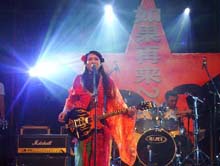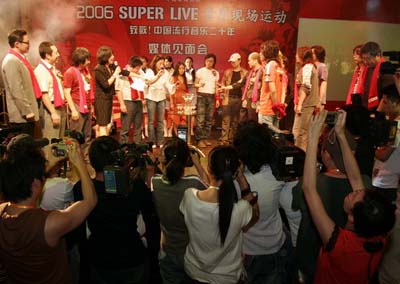| Tools: Save | Print | E-mail | Most Read |
| Chinese Rock 'n' Roll: It Was 20 Years Ago... |
| Adjust font size: |
"It was 20 years ago today…" The lyrics from the Beatles' famous tune Sgt. Pepper's Lonely Hearts Club Band may well suggest Chinese music fans' nostalgia. However, it couldn't even secure "sold-out" 20th anniversary concerts for Chinese rock music held in Shenyang, Liaoning Province in mid-June. Cui Jian, the "godfather of Chinese rock 'n' roll," emphasized in an interview that rock is not dead yet in China but admitted the musicians are finding it difficult. Between June 16-18 hundreds of Chinese rock fans were treated to live performances by 20 legendary or new rock musicians such as Cui Jian, the Tang Dynasty band, Wang Lei, Wang Feng, Xie Tianxiao and the Subs. Fans came not only from Shenyang but also from Beijing, Chengdu and Xi'an, though the numbers were not great. The three-day concert titled "If There Were to Be Another 20 Years" began with Cui Jian performing his classic song, Nothing to My Name. The 44-year-old rock legend appeared with his traditional outfit -- a white cap printed with a red star, just like 20 years ago when he first performed the song in a concert at the Beijing Workers Stadium on May 9, 1986. This date is recognized as the beginning of Chinese rock music. Some of the best new musicians in the country played at the five-hour carnival including Sound Fragment and Subs, a high energy punk band that was featured in recent headlines. The bands played music ranging across a variety of genres -- from pop punk to indie rock, folk to electronica and metal to grunge -- showcasing the depth and range present in China's fast-growing rock scene. But the attendance was disappointing. Only about 600 fans attended the first concert in a local gym that can accommodate 3,000 people. The next two concerts attracted larger crowds but the venue was never packed.
According to the Shanghai Morning Post less than 30 percent of tickets for the first concert were sold. The local promoters are said to have lost 1 million yuan (US$125,000) due to the box-office failure. They blamed it on the concert dates, which clashed with the ongoing soccer feast World Cup. "Too many rock fans are also diehard soccer fans," Jiang Xiaoyu, the general organizer of the concerts, said on June 19. "It must be the problem with the date. However, if we make these anniversary concerts into a brand, we may succeed in the future by choosing the right dates." But fans without tickets to the concerts told Shanghai Morning Post that the high admission fee is another reason why the concerts have failed. The lowest price is 200 yuan (US$25), perhaps an acceptable price in metropolises, but very expensive for rock fans who are usually students or daydreaming youngsters. "The so-called 'anniversary' is meaningless if we don't use the opportunity to go forward," Jang said. "We don't miss those old corrupted rock music pieces any more; instead, we want to launch rock's new power and new generation." He may be right. Rock's new generation has strong intentions of replacing the old rockers themselves. For example, the lead female vocalist "Kang Mao" from Subs wrote in her blog, "Cui Jian led the 20th anniversary project and I supported him for he is a real man. But I'm very sick to see the media reports still stuck on those old folks, some of whom I think are just has-beens. It has been 20 years! Will another 20 years be for these has-beens? How I hate it!" But the rising new stars of the Yufeimen band said, "No one can replace Cui Jian and the Tang Dynasty band because their fans are still there -- growing old with them. Our audience should be targeted on youngsters. We don't have to compare something like this." Even Cui Jian himself doesn't want to be called the "Godfather of Chinese Rock." "The image of 'godfather' may be painless and conservative, but I hope the 'godfather' will die," he said. "I prefer to be a grandson of myself. As an ordinary man I feel great joy when I'm doing music but not being as an icon." Also as the executive art director, Cui invited many rock musicians from the "new generation" to attend.
Jiang Xiaoyu said the bad economic situation for those who had rock dreams has changed. "When your rock music is unique and soulful, and has content, you will be rich enough to survive and develop yourselves." According to Jiang, a new generation of consumers with high demands and interests in rock music has come to light in recent years. Many rock bands now have opportunities to perform, make a living and even fly overseas to stage shows, he said. Wang Lei, a veteran rocker, said it's a mistake to think rockers are in the margins. "Rock musicians can be at a middle-class level if they play it right." Yet unlike pop music, rock music has never been the mainstream in China. The first generation of Chinese rock music was led by Cui Jian, Tang Dynasty, Panther, ADO and Zang Tianshuo in the late 1980s. They were original and independent rock musicians without too many commercial factors attached to them. The second generation in the 1990s was represented by Dou Wei, He Yong, Zhang Cu, as well as the bands of Baojiajie 43 and Zero Point. At this time the commercial side of the business started to influence Chinese rock. And because of this the rock somehow became more like pop music. Cui Jian thinks the commercial steps taken by Chinese rock music during this period were significant. Among the third generation are Second-hand Rose, CMCB, Muma and Brain Failure. With its rise today's rock music appears to have more variety. However, it's too unique and too ego driven for the general public. Therefore, its attractions have been limited to various small groups of fans. Cui Jian said if there were to be another 20 years, "I hope someone would be proud of being a rocker and make a living with the right kind of music. There will be obvious changes in terms of their social status."
"The environment for Chinese rock has improved," Jiang Xiaoyu said, but he was not satisfied. "In the West rock is mainstream. Look at the Rolling Stones, they can make millions of bucks out of their music and concerts. But in China some guys singing rubbish pop songs can earn far more than real rockers can. Only from the rock music and original songs can I discover the rockers' real soul, knowledge and value." But Yan Jun, one of the most famous music critics in China, told China Newsweek magazine that rock 'n' roll in the West is a natural development growing from its developed cultural environment since the 1950s. "The day when Chinese rock was born was not very far away from the end of the 'Cultural Revolution.' China had no teen culture and no urban entertainment then. Rock was like something from the middle of nowhere. So it's not surprising to see it has never been mainstream." Hao Fang, chief editor of Rolling Stone magazine (Chinese version, a.k.a Audiovisual World), further suggested that Chinese rock has "never been so sacred, so underground or so rebel. The marginal image is made by the public and rock musicians themselves!" He said that in the present new era, compared with the cultural value that is always supposed to be with rock music, its technical side, concepts and genre diversity are gaining more and more popularity. The interviewees of China Newsweek including the two critics above as well as Cui Jian and Jiang Xiaoyu all agreed rock music will be back in mainstream someday though it never really was! As more and more companies invest in musicians who are gradually becoming down-to-earth performers working in bars or touring, the rock culture will be cultivated and the real lifestyle of rock lovers will re-emerge. So despite the Shenyang's failure and various concerns the rock celebration will continue. Cui Jian is now ready for his "2006 Super Live" concerts in Beijing, which will open on July 14.
2006 Super Live Launch Ceremony According to Shenzhen Daily of June 26, Cui will perform at the Beijing Candy & Star Live Hall from July 14-15. Advocating a "sing it live" spirit Cui's first performance will be "unplugged" with no accompanying electronic instruments. This will be the singer's first show using acoustic instruments in his 20-year career, said a source with Mediact Jingwen Group, the show's organizer. The "2006 Super Live" series will run until 2007. With the slogan "Music goes back live to where it started live" all the shows will be solo or themed concerts. Tickets will be on sale at the end of June. And there's more good news for music fans. Musicians from the same-aged Chinese pop music industry will hold anniversary celebration concerts in Beijing in September as they did 10 years ago. Cui Jian, of course, will make an appearance in the rock genre concert to promote Chinese rock. Two other concerts will also be performed at the Great Hall of the People in November. Meanwhile, 800 singers, musicians, producers and media members will be honored for their contributions to Chinese pop music. (China.org.cn by Zhang Rui, July 10, 2006)
|
| Tools: Save | Print | E-mail | Most Read |
 |
| Related Stories |
| Product Directory China Search |
Country Search Hot Buys |



